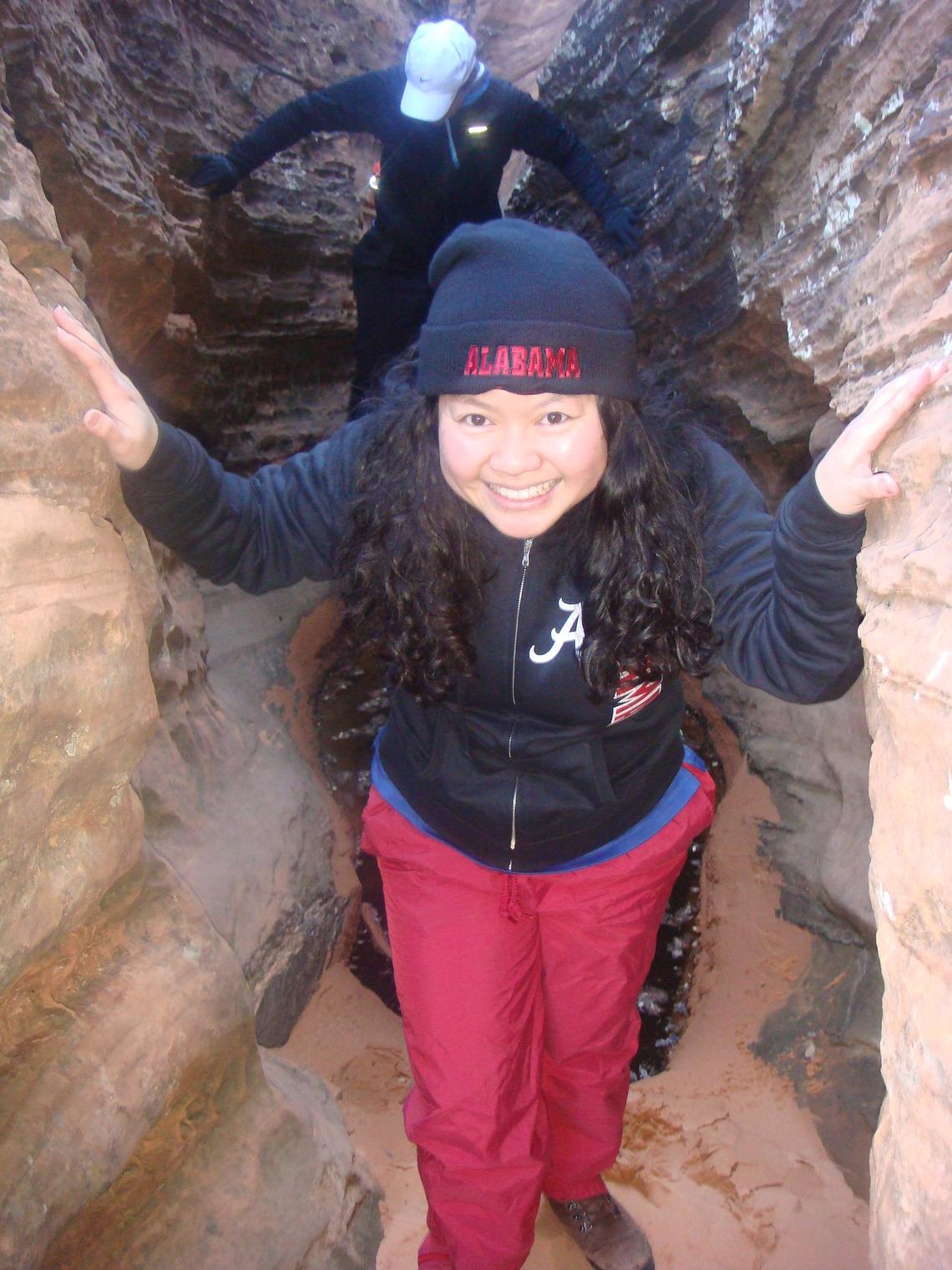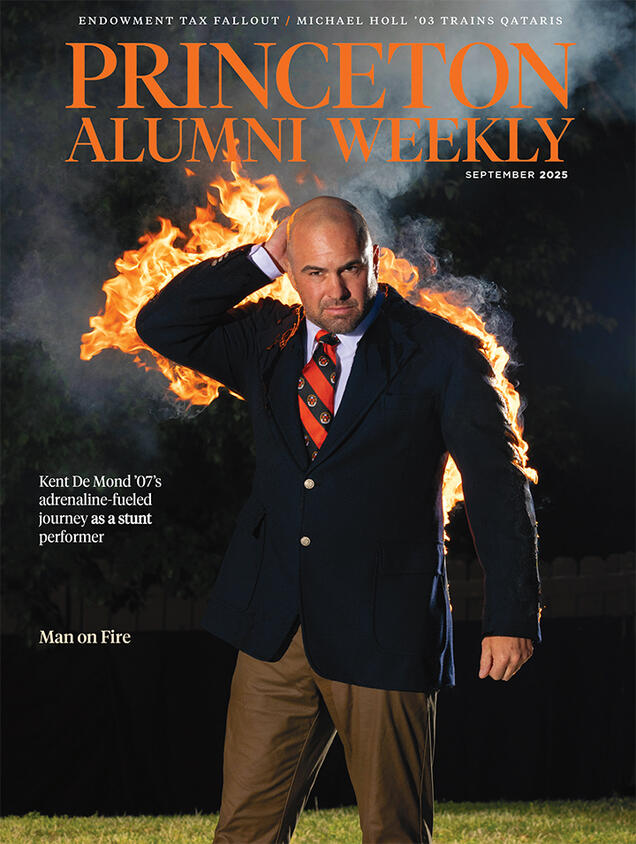
Jenny Korn ’96 tried to build connections as an undergrad, founding Princeton’s Thai-American Student Organization, and that theme has continued, both in her work and in a Chicago-based alumni group.
PAW Tracks is also available on iTunes — click here to subscribe
TRANSCRIPT
Allie Wenner: Meet Jenny Korn. She’s a member of the great Class of 1996.
Jenny Korn: I’m Jenny Ungbha Korn (that’s my full Thai name). I go by Jenny Korn. I live in Chicago, grew up in Alabama (you might hear it). I’m in Chicago now and I’m a scholar of race and media.
AW: Like many other Princeton alumni back on campus during Reunions weekend, Jenny made a point to visit Hoagie Haven and Thomas Sweet and excitedly donned her Princeton earrings for the weekend. But unlike many other alums, Jenny proudly wore her Alabama Crimson Tide T-shirt during the Thursday of Reunions. She’s a proud Alabamian — and even makes a point to drop a “Roll Tide” reference two minutes into our conversation.
JK: That’s right, that’s right, I have to rep Alabama — and with that, I have to say “Roll Tide,” and if you’re a football fan then you know what that means.
AW: But Jenny left the Crimson Tide behind to become a Tiger in the fall of 1992, and she said she was blown away by how diverse it was here on campus — back in Alabama, she was the only student of Asian decent in her class.
JK: I also credit leaving the state of Alabama with getting to meet a greater diversity of people in general. Seeing other Asians was like “oh my god.” And Asians of all sorts of ethnicities, that was amazing. Meeting out gay people, meeting Jewish folk. I mean this was diversity that a lot of big city folk take for granted. But when you’re in a small town in Alabama, you don’t necessarily meet people like that.
I mean to be honest with you, I remember feeling very alienated, like I felt very othered actually, because there was nobody else that had had a similar experience to me. So the first thing that people said when they met me was (and it still happens today, and I’m very used to it now), “Oh my god you look Asian but you sound Southern.” And people called it out like immediately — they’re like “this is not what I expected to see when you speak.” I don’t know what accent they expected, but not this, not Southern.
When you’re in Alabama, nobody calls you out on your accent because everybody speaks the same. But when you leave the state, everybody’s like “wow, you have a really strong Southern accent.”
I tried to go back to things that would represent potential axes of similarity. So I looked up all of the Alabama folks — we had a Facebook, but it was a physical book. And I think the other Alabamians were all white, and so then their experiences didn’t represent mine. So then I didn’t have that to go on, and I was just like, “I’m alone.” I felt very scared, actually.
While I was here at Princeton, I founded the Thai-American Student Organization, its called TASO. And there were like five of us! There weren’t that many of us, but we were a community. And we were a community that shared a culture, even though we were all from different states in the country and also from Thailand itself.
I definitely wanted to meet other people that I thought would share a similar cultural background, whether that be a Thai ethnicity, whether that be Southern, anything. I was reaching, trying to find somebody that could get me, understand me, not judge me, and with whom I could form community. And that’s actually a theme that I think I have kept going my entire life, is when you feel like you don’t belong, then you definitely don’t want to promote that kind of feeling wherever you go. You want to minimize it, you want to make sure that everywhere else you go, that other people will feel part of that community. And so I think I’ve carried that forward.
AW: Jenny eventually found her own niche at Princeton. Aside from her role as president and co-founder of TASO, she was also as vice president of Princeton Women’s Outreach, she was a Student Alcohol Peer Educator, and she joined Terrace Club. And Jenny’s especially proud that she wrote, directed, and produced a play called Consequential Sex, which was about female prostitutes in Thailand. She even got to travel to Thailand do research for the play and taught English to some of the women she interviewed there.
These days, she’s pursuing a Ph.D. in race and media at the University of Illinois at Chicago, where she researches “why and how race and gender matter online.” She’s also facilitating conversations about race with fellow Princeton alumni in Chicago through Princeton Club Diversity, an informal discussion group she founded more than two years ago.
JK: We are on our third year now, and we are an in-person discussion group. It’s transracial, and we talk about issues of race. And we meet every month.
A lot of Princeton alumni events continued to attract the same traditional populations for attendance. And that was leaving out a whole bunch of other folk that were also alumni but just didn’t feel like the events were speaking to them.
And so our events are different because we are all there knowing that were gonna talk about race, and that tends to draw out people who realized that they are “raced” and that includes white folk. It definitely impacts people of color differently. And so our events are different because we’re a majority of color, not the other way around. And we meet every month.
And I think it’s necessary if you’re talking about a topic like race to meet regularly. Because talking about race once, I mean that’s good but its not like race only happens one time and you’re done. It’s discussions that are ongoing. They have to be. And we’ve had a lot of great friendships that have been formed through that, trans-racial friendships, trans-generational, all different races, ages — and it’s been great.
In the end we share our personal experiences, whether its about Princeton, or our jobs, or a TV show — and we laugh a lot. And that’s the thing, like race, it can be very serious, but race should also be celebrated. Race should not equal racism. It definitely has racism in it, like we all have had those experiences, but it’s something to laugh and to cheer about — that we’re all folk of color and were celebrating our Asian-ness, our Blackness, our Latino-ness. It’s great.
I think the biggest thing is knowing that there are Princeton alumni events that are catering to alumni of color and that we want to create a space that is more than just safe, but encouraging for alumni of color. We have people who come to our events who’ve never come to Princeton alumni events because they’ve not felt comfortable. They know our events are going to be primarily for people of color, and so they’ll come to them because they know that one less potential challenge that they might have to encounter is gone.
In terms of having individuals even consider that Princeton would be a school to apply to, it’s very helpful to see other alumni come back and encourage those new generations to apply. Which is why I think groups like APBA, ALPA, A4P, the race based affinity groups, are very important. So I’m always supportive of endeavors that mentor, endeavors that go speak at different high schools. We always encourage one another to volunteer to be those interviewers for Princeton admits.
I just think it’s just seeing yourself — it also goes back to media. It goes back to where do you see people of color being represented? If you see them being represented in these leadership roles at these Ivy League institutions, then you’re gonna be like “I see myself, I could do that.” Because Obama is our president, I know there are people out there thinking “I can do that too now.” It’s just being aware, looking around and seeing others like you doing it.
Paw in print

September 2025
Stuntman Kent De Mond ’07 is on fire; Endowment tax fallout; Pilot Michael Holl ’03 trains Qataris

No responses yet